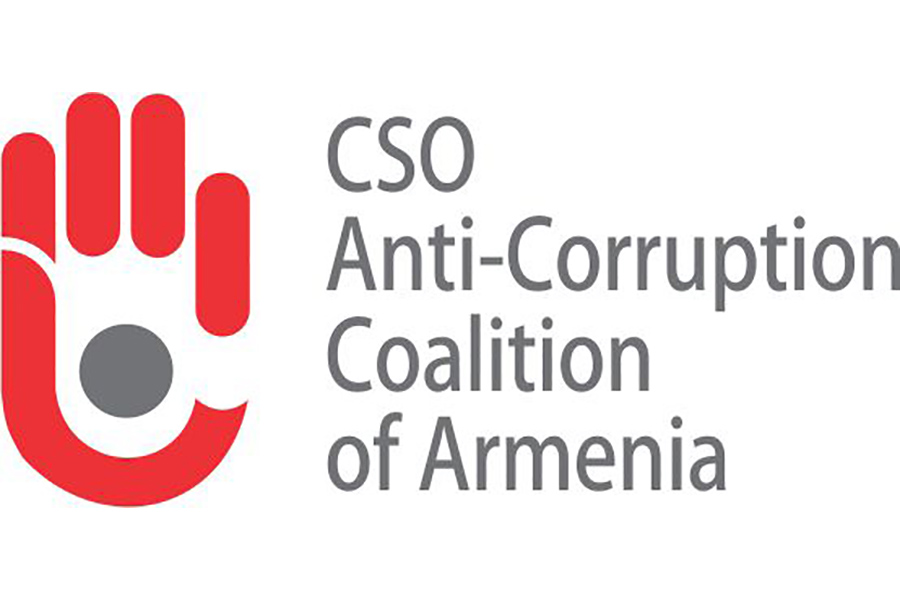
The Governing Board of the CSO Anti-Corruption Coalition of Armenia expresses its concern over the current situation of effective cooperation of the civil society with state governance and local self-governance bodies in the policy-making and implementation of policies in different spheres in the Republic of Armenia. It is characterized by several key issues that can be characterized as evasive and cautious. As a result, numerous pre-election and political statements by the current Armenian authorities on cooperation with civil society organizations are being violated.
The Governing Board of the Coalition is also concerned about the discrimination, imperfection, and controversial provisions of the legislation governing the taxation of non-governmental organizations.
Particularly, there is no and does not exist a “Concept and Strategy of Institutional and Legislative Reforms Development for Civil Society Organizations” in the Republic of Armenia, which would be consistent with the provisions of the Government’s program, commitments of the EU-Armenia Comprehensive and Extended Partnership Agreement, and the objectives of the “National Human Rights Defense Strategy” approved by the Presidential Decree 159-N of 29 October, 2012 The, as set out in.
The above mentioned is also expressed in the same way in unfavorable regulations in the RA Law “On Non-Governmental Organizations” adopted in December 2016, as well as the Tax Code of the Republic of Armenia effective since 1 January 2018. Moreover, these concerns have increased even more now with a number of legislative initiatives on “Making Amendments and Addenda to the Tax Code of the Republic of Armenia” at the stage of discussion at the RA National Assembly.
Thus, when adopting the RA Law on Non-Governmental Organizations, many opinions of civil society representatives were ignored, which contradicts with the main objective of institutional and legislative reform of CSOs approved by the Government Decree, namely, provision of normal functioning and sustainable development of CSOs. As a result, the CSO sector faces a number of challenges.
First of all, the most important issue is related to the unfavorable norms of the RA Tax Code. Thus, under the RA Law on Non-Governmental Organizations, NGOs are permitted to engage in entrepreneurial activity. However, the RA Tax Code considers CSOs among the commercial organizations. In this regard, a proposal by a number of CSOs to allow NGOs to operate in a taxable turnover mode has been denied and has not yet been resolved.
Further, the RA Tax Code does not allow CSOs to act in tax privileges mode such as the Central Bank of Armenia, the Armenian Apostolic Church, and other religious organizations and national operators.
Moreover, tax and financial accounting regulations in case of conducting business activities by NGOs are unclear and cause serious corruption risks.
There is also no clear legal framework for cooperation with CSOs in the RA Tax Code.
A number of provisions defined by the RA Law on Non-Governmental Organizations (such as grants, reporting, auditing) do not promote CSO activities, and in addition create serious difficulties in organizing their activities.
At the same time, the law stipulates that the organization has the right provided by law to represent and protect itself and the rights and legitimate interests of its members, volunteers and beneficiaries… in court…: Whereas, in the next article of the same law, this right is restricted only to the scope of the Law of the Republic of Armenia “On Environmental Impact Assessment and Expertise”. First of all, this provision is discriminatory in respect of sectoral activities and contradicts the RA Constitution. Moreover, these norms are not actually practiced because their implementation is associated with numerous bureaucratic delays. This is evidenced by numerous public discussions, of CSOs, and information collected through actual activities. According to them the citizens of the RA in most cases are helpless in protecting their constitutional rights and freedoms. CSOs are unable to present their interests in court because of the above limitations of the RA legislation. Moreover, in order to represent the interests of CSO beneficiaries in the Court, a Notarized Power of Attorney is required, which is a serious financial burden for both beneficiaries and CSOs, especially those CSOs who have no funding. This obstacle is also in line with the following goal: “One of the most important preconditions for CSOs’ efficiency is ensuring their financial sustainability.”
Certainly, some changes are made to the RA Administrative Procedure Code and related laws, including the Law on NGOs, but the process of their adoption seems to have been dropped to the background.
We call on the RA National Assembly and the Government, in cooperation with the civil society and the expert community, to overcome these problems:
- elaborate relevant legislative and normative acts, ensuring the role of civil society organizations in the work of public administration and local self-government bodies,
- provides for tax exemptions for property tax, for the CSOs in the RA Tax Code
- To grant CSOs the right to operate in the taxable turnover regime as prescribed by law,
- To grant CSOs the right to act in micro-business mode as prescribed by law,
- Make amendments and additions to the Tax Code of the Republic of Armenia in which the role of CSOs will increase in the framework of tax and customs administration,
- Ensure that the process of reviewing and adopting amendments to the Administrative Procedure Code and related laws, including the Law on NGOs, which are aimed at ensuring that NGOs freely, without sectoral limitation, represent and protect themselves, as well as the rights and legitimate interests of members, beneficiaries and volunteers in court.
The CSO Anti-Corruption Coalition of Armenia, having clear vision and justification for overcoming these problems, is committed to investing in its expertise and organizational capacities.
June 14, 2019
Governing Board of CSO Anti-Corruption Coalition of Armenia
